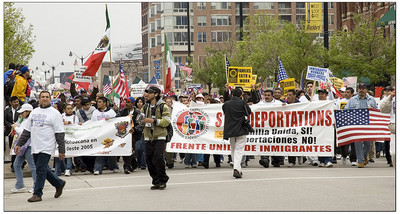For all its dysfunction, immigration politics has followed a more or less predictable cycle during the Obama presidency. For Obama and the Democrats, there are two goals. The first is long-term and principled: to pass comprehensive reform and resolve longstanding problems with the nation’s immigration system. The second is short-term and political: to extract, until the moment that bill passes, as much political benefit as possible from supporting a measure that Hispanics (a quickly growing portion of the electorate) care deeply about. The recurring problem is straightforward: The second goal is in tension with the first.
That’s because in order to make a legislative deal with Republicans, the White House decided early on that it would need to take steps that would undermine its political standing among Hispanics. No President likes to outline strategy so bluntly, but this thinking was obvious from the Administration’s actions. Early on, it beefed up border security and increased deportations, all in an effort to bolster credibility and earn goodwill among conservatives as a prelude to a deal. Congressional Republicans, the White House seemed to think, would never come to the table if they saw the President as weak on immigration. If Obama could prove that he was tough, he would be insulated from charges of amnesty.
These credibility-boosting steps, of course, are precisely the measures detested by so many Hispanics. In order to mitigate this political damage, the Administration has awkwardly attempted to pair its aggressive enforcement with a series of relief measures for undocumented immigrants who have U.S. citizen spouses or children, were brought over as children, and so on. But these steps have been implemented inconsistently (or, in some cases, not at all), and Obama has been accused of amnesty anyway. Nobody, it seems, is satisfied.
This is the crucial background for a story that broke Tuesday night: the White House is delaying a high-profile Department of Homeland Security review of its widely criticized deportation policies “in a move aimed at salvaging any hopes for Congress to act on immigration this year.” In March, after months of attacks from immigration advocates, Obama ordered DHS (which oversees the various immigration agencies) to evaluate whether there was any way, within existing law, for the Administration to handle deportations more humanely. I’ll confess to skepticism about the review: Obama had already suggested, first of all, that he was approaching the limits of what he thought he could do without passing new legislation. (Legal experts largely agree that the President hasn’t exhausted his discretionary authority, but Obama’s reluctance to take more steps based solely in his presidential authority is also a political calculation.) Second of all, even the Administration’s best immigration ideas have often been bungled at the level of enforcement. Even if the President were willing to risk a huge political fight over more relief measures, those measures would still have to be carried out, and they probably wouldn’t outlast his administration.
House Republicans were also skeptical of the review, but for different reasons. The announcement of a fresh look at DHS policy, as the AP explains, “emboldened House Republicans to argue they can’t trust Obama to enforce the law,” and the GOP indicated that any new steps resulting from such an overview “would deliver a death knell to the broader immigration overhaul that Obama and Democrats are seeking.”
Republican clamor over the DHS review is partly opportunistic. For a mixture of electoral and ideological reasons, the House GOP is unlikely to support comprehensive immigration reform under any circumstances. But it’s also true that Republicans don’t trust the administration, which now finds itself (once again) trapped in the vicious, predictable cycle of immigration politics. The DHS review was supposed to buy the President some much-needed goodwill with Hispanics, but now he’s tossing that away in the quixotic hope of buying goodwill with the Congressional GOP. It’s the same cycle over and over again: get tough and anger allies; scale back and anger opponents. By waffling on its highly publicized review, the White House is responding to its opponents’ anger—but now it risks further alienating its allies. And besides, lots of House Republicans simply loathe the idea of legalizing millions of undocumented immigrants, whether the DHS issues its report or not.
It’s not clear that the White House has any way of escaping this cycle. To break it—that is, to go big on executive action and give up on the (probably doomed) hopes for reform—is not in the cards. The administration doesn’t want the massive political fight that would inevitably result (and spill over into its other priorities), and as I noted above, whatever steps it could take would be partial and temporary anyway. The President has to keep holding out hope for a permanent fix, however distant the odds. His DHS review isn’t the obstacle standing in the way of comprehensive reform. The House GOP is, as it has always been. Delaying the review to placate them is just a sign that we’re still stuck in the cycle, and history tells us where that leads.
Photo credit: Seth Anderson

Click to
View Comments